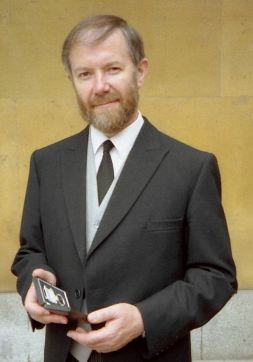
Marine Geophysicist who led pioneering studies into the tectonic and environmental history of the Southern Ocean
Dr Peter Barker, who died on 25 June 2012 aged 73, was a marine geophysicist who led pioneering studies to unravel the tectonic and environmental history of the Southern Ocean over more than three decades.
Peter was born and brought up in north Staffordshire. At the age of 11 he won a scholarship to Newcastle Grammar School and in 1957 entered Kings College London to read physics, graduating 1960. As a teenager he developed a passion for outdoor activities together with his life-long friend, geologist John Bradshaw, who later emigrated to New Zealand. After they both graduated, Peter and John arranged student expeditions to Iceland in 1960 and 1961. Through one of these, Peter got to know Jenny, whom he married in 1963. Peter undertook postgraduate study at Imperial College, and became involved in marine geophysical work in the Arabian Sea.
In 1964 Peter moved to Birmingham University to join the Antarctic Marine Group (AMG), which Professor Donald Griffiths had established in the Department of Geological Sciences. A year later, Griffiths handed over its management to Peter, who led and developed it over the next 21 years. During this time he was Principal Scientist on many research cruises on RRS Shackleton and RRS Bransfield, the data collected on those cruises underpinning our present understanding of the geological structure and tectonic evolution of the Scotia Sea region. Many early-career scientists took their first steps in research under Peter’s guidance at AMG.
Peter became Head of the British Antarctic Survey (BAS) Geophysics Division in 1986, and moved to Cambridge. During his first few years, Peter played an important part in specifying the scientific facilities on a new polar research vessel, RRS James Clark Ross, launched in 1991. BAS still operate the ‘JCR’ and, even today, visiting scientists remark on what an excellent platform it is for multi-disciplinary marine research – a testament to its design vision. Peter went on to lead several research cruises on JCR.
Peter was awarded the Polar Medal in 1991 (picture) for outstanding achievement and service to British polar exploration and research. He was widely respected internationally, and was invited to sail as Co-Chief Scientist on four DSDP and ODP expeditions, making fundamental contributions to understanding the tectonic and environmental history of South Atlantic and Southern oceans. Peter became a leading figure in the Antarctic and Southern Ocean geoscience community, actively fostering international cooperation. He continued working at BAS until retiring in 1999, and subsequently as an emeritus scientist for a further three years. Peter remained a ‘sea-going scientist’ beyond retirement, his last voyage being as an invited participant on a cruise to the Scotia Sea aboard a US research vessel in 2008.
In 2005 Peter and Jenny moved to rural Shropshire, enabling them to embrace their passion for hill-walking. Peter was still working on papers in the early part of 2012. An international symposium on Scotia Arc geology will be held in Spain in May 2013 in his honour. He is survived by his wife Jenny, son Dan and daughter-in-law Nicola.
Written by Rob Larter